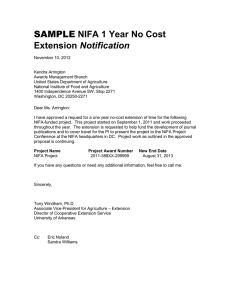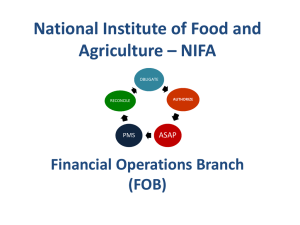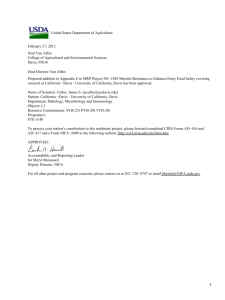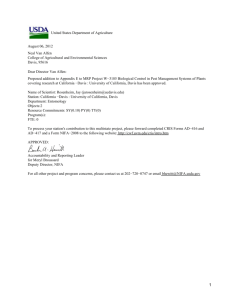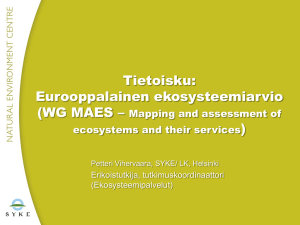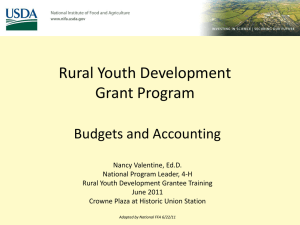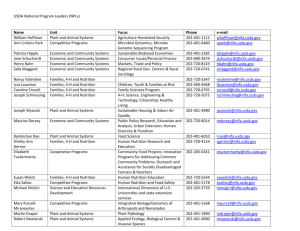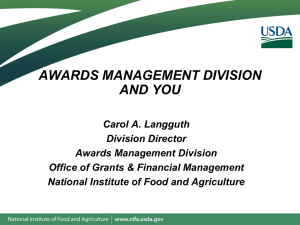MSU MAES Project Proposal Format
advertisement
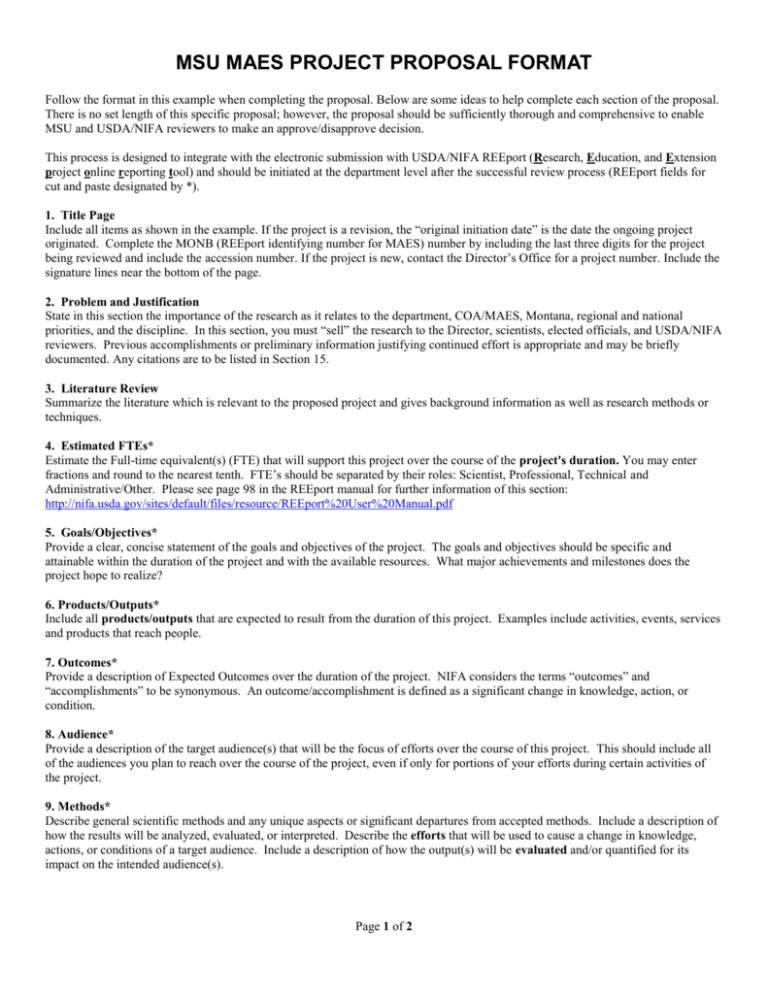
MSU MAES PROJECT PROPOSAL FORMAT Follow the format in this example when completing the proposal. Below are some ideas to help complete each section of the proposal. There is no set length of this specific proposal; however, the proposal should be sufficiently thorough and comprehensive to enable MSU and USDA/NIFA reviewers to make an approve/disapprove decision. This process is designed to integrate with the electronic submission with USDA/NIFA REEport (Research, Education, and Extension project online reporting tool) and should be initiated at the department level after the successful review process (REEport fields for cut and paste designated by *). 1. Title Page Include all items as shown in the example. If the project is a revision, the “original initiation date” is the date the ongoing project originated. Complete the MONB (REEport identifying number for MAES) number by including the last three digits for the project being reviewed and include the accession number. If the project is new, contact the Director’s Office for a project number. Include the signature lines near the bottom of the page. 2. Problem and Justification State in this section the importance of the research as it relates to the department, COA/MAES, Montana, regional and national priorities, and the discipline. In this section, you must “sell” the research to the Director, scientists, elected officials, and USDA/NIFA reviewers. Previous accomplishments or preliminary information justifying continued effort is appropriate and may be briefly documented. Any citations are to be listed in Section 15. 3. Literature Review Summarize the literature which is relevant to the proposed project and gives background information as well as research methods or techniques. 4. Estimated FTEs* Estimate the Full-time equivalent(s) (FTE) that will support this project over the course of the project's duration. You may enter fractions and round to the nearest tenth. FTE’s should be separated by their roles: Scientist, Professional, Technical and Administrative/Other. Please see page 98 in the REEport manual for further information of this section: http://nifa.usda.gov/sites/default/files/resource/REEport%20User%20Manual.pdf 5. Goals/Objectives* Provide a clear, concise statement of the goals and objectives of the project. The goals and objectives should be specific and attainable within the duration of the project and with the available resources. What major achievements and milestones does the project hope to realize? 6. Products/Outputs* Include all products/outputs that are expected to result from the duration of this project. Examples include activities, events, services and products that reach people. 7. Outcomes* Provide a description of Expected Outcomes over the duration of the project. NIFA considers the terms “outcomes” and “accomplishments” to be synonymous. An outcome/accomplishment is defined as a significant change in knowledge, action, or condition. 8. Audience* Provide a description of the target audience(s) that will be the focus of efforts over the course of this project. This should include all of the audiences you plan to reach over the course of the project, even if only for portions of your efforts during certain activities of the project. 9. Methods* Describe general scientific methods and any unique aspects or significant departures from accepted methods. Include a description of how the results will be analyzed, evaluated, or interpreted. Describe the efforts that will be used to cause a change in knowledge, actions, or conditions of a target audience. Include a description of how the output(s) will be evaluated and/or quantified for its impact on the intended audience(s). Page 1 of 2 10. Non-Technical Summary* Describe the need for this project as well as its overall purpose. Also include general statements describing the methods, the expected outcomes/impacts, and the anticipated benefits. Provide information at a level that general citizens could identify with. 11. Keywords* It is important to assign appropriate keywords for automated information retrieval of project information. Limit keywords to one or two word terms. Limit 20 lines. 12. Project Evaluation For new projects provide information from prior history that is relevant to the proposed project. For continuing projects, summarize annual progress reports and/or provide other summary information and metrics for the current project. In addition, for continuing projects, specific outcomes/impacts should be clearly identified and articulated in non-scientific language (e.g. new knowledge, scientists trained, economic results, new capacity or capability). 13. Literature Cited List citations from all sections of the proposal. MSU MAES PROJECT PROPOSAL FORMAT (continued) - - - - - - - - - - - - - - - - - - - - - - - - - - - - - MAES Internal Use Only - - - - - - - - - - - - - - - - - - - - - - - 14. Financial Support Estimate annual financial needs to (1) salaries and benefits, and (2) operations for each year of the proposed project. Include the current/pending/potential grants to help support this research. Current Grants (Amount/Duration/Agency) Pending Grants (Amount/Duration/Agency) Other Resources 15. Publications and Grant Activity Provide a list of publications (including articles submitted) and grant activity (agency/amount/duration) that you have obtained over the current project cycle. For new projects, a CV would be sufficient. 16. Institutional Animal Care and Use Committee (IACUC) (Assurance Statement*) Provide a copy of your approved application for your Animal Care and Use. 17. Project Initiation in REEport Upon approval by the Department Head and MAES Director, you will be notified that your Project Initiation is ready to be completed in REEport. This is the final step in the review process and submits your project to NIFA for National Program Leader (NPL) review and approval. For assistance on accessing and completing these forms, please contact jody.barney@montana.edu in the Director’s office. Instructions are also available at http://nifa.usda.gov/sites/default/files/resource/REEport%20User%20Manual.pdf Page 2 of 2
